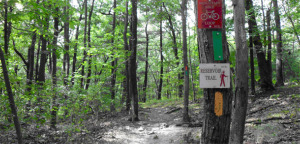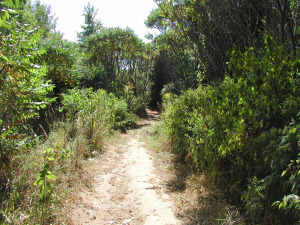
Each of the dozens of parks dotting metropolitan Boston has a community of "friends."
These grassroots groups help with park maintenance as well as educating the community about park activities. In the best case, the collaboration between friends groups and governmental organizations is one of the best example of ordinary citizens getting involved and playing an active role in shaping their community.
But in some communities those friends have found enemies in the governmental agencies designed to protect park land.
The Friends of the Middlesex Fells is battling a development deal approved and supported by The Massachusetts Department of Conservation and Recreation, the organization that is charged with defending the Fells.
The Case of the Fells
The Middlesex Fells is a 2,060-acre diverse collection of hardwood forests, meadows, wetlands and quiet ponds. Established in 1891 with an initial donation by landscape architect Charles Eliot, the reservation is located in Malden, Medford, Melrose, Stoneham, and Winchester.
"It's this rare oasis," Mike Ryan, executive director of the Friends of the Fells, said. "Boston is just seven miles away and it is surrounded by cities but it is big enough to get lost in."
The Friends of the Fells group was founded 25 years ago with an eye on education. The group started a lecture series about different species of plant and animal life in the Fells. It also worked to put up better signage to educated mountain bikers about which trails they were allowed to use because they were tearing up the walking trails.
"A lot of people look at the fells and see a blank slate," Ryan said. "They don't understand what's there. You have to build value psychologically. Once you realize there is something rare and special there in that green space you are naturally inclined to protect it."
The groups focus was forced to shift in 2000 when the Guiterrez Group bought the recently closed Boston Medical Center that sat in the center of the Fells,on a 40-acre plot right across from Spot Pond. Guiterrez's initial plan was to put in a million square feet of office space- a facility that Ryan said would be about the size of Copley Place in Boston.
Ryan said the plan for such a massive development deal that would threaten the park and add 5,000 extra car trips to the already congested historic parkways in and around the Fells has forced the group to expand its original vision.
"We have found ourselves doing things we never thought we would have to," Ryan said.
The group has hired attorneys to file lawsuits and experts to conduct traffic studies and environmental reviews.
Because of their efforts, the first four attempts to launch the development failed. Each time, the plan failed to pass environmental review by the Massachusetts Environmental Protection Agency.
With the last defeat, the Guiterrez Group changed tactics. The development firm said that because they had reduced the development in size, they would not have to file any permits for curb cuts or any other traffic changes.The group reached a deal to pay for $1.8 million in road improvements
that were necessary without having to go through an approval process.
This allowed them to skip the environmental review and apply for an advisory opinion from Massachusetts Environmental Secretary Ian Bowles. Bowles found that the project could go forward without environmental review.
"Although MEPA is an important tool for review of environmental impacts caused by private projects proposed in the Commonwealth, I have no legal authority to compel MEPA review of such projects unless they require a Permit, and Land Transfer or Financial Assistance, regardless of the magnitude of their potential impacts," Bowles wrote in his decision.
"The decision puts business first," Ryan said. "A century-old park and reservation would be converted for the private profit of a single company. It doesn't make any sense."
The Friends of the Fells filed a lawsuit challenging the decision in Middlesex Superior Court. Judge Bruce Henry let Bowles' decision stand, saying in his March 31st decision that he did not have the authority to overturn a decision that was reasonably made.
In an interview with the Boston Globe after the ruling, one of the Guiterrez Group's attorneys, Greg Peterson, applauded Henry's decision.
"It's wonderful news," Peterson told the Globe. "After 10 years of process and litigation around this project in terms of state environmental impact review and state historical review, it's nice to have clearance blessing a pretty tough decision by the secretary of environmental affairs."
Henry's decision seemingly clears the way for the beginning of construction on the 225,000 square-foot commercial portion of the project.
While Ryan said the group plans to appeal, he acknowledged it is frustrating that the Friends of the Fells find themselves fighting against the DCR, the group that is meant to protect the Fells.
"Resource protection should be DCR's first priority but it's not," Ryan said. "You find yourself fighting an agency that is funded with taxpayer money that is meant to protect resources. You are fighting them because their policies are destructive of those resources."
 What is Lost Steven Keleti, the president of The Friends of Mary Cummings Park, can sympathize with Mike Ryan and the Friends of the Fells.
What is Lost Steven Keleti, the president of The Friends of Mary Cummings Park, can sympathize with Mike Ryan and the Friends of the Fells.
Mary Cummings Park is the 12th largest park in metropolitan Boston, sitting on 210 acres in Woburn and Burlington. The park was established as part of specific instructions in the will of Mary Cummings after her death in 1927. Cummings specified that she wanted the park to be preserved as a "public pleasure ground." She left the park in trust and named the city of Boston the manager of the trust.
While originally overseen by the Boston Parks Department, control was transferred to the treasury department during the Flynn administration. The Friends have found dealings with the city to be difficult.
"The idea of the treasury department was that if (the park) was no longer usable they could change the wording of the trust and change it from being a park to an asset."
Before the friends group was formed in 2007, Keleti said the park was essentially abandoned, with most people in Burlington and Woburn not even knowing it was there.
The Friends group has struggled against what they see as multiple attempts to undermine the viability of the park with an eye on selling the land for development (details here).
The struggles to work with the city of Boston have forced the group to divert attention. Instead of concentrating on bringing the park back to life, the group has had to focus on making sure the park is maintained and not developed. Boston's Treasury Department would not comment on what plans- if any- they had for the land.
"The lack of communication and unwillingness of the city of Boston to acknowledge its responsibility as a trustee has made for a lot of work," said Keleti. "Instead of putting our energies into starting children's programs and helping to revitalize the park, those energies have had to go to encouraging Boston to do the right thing."
That idea of having to divert attention from the park group's original purpose echoes Mike Ryan's thoughts. He said the Friends of the Fells could do a lot more for the park if not always having to focus on the advocacy work. Ryan said there is a payoff though.
"The silver lining about the defense work is because when you take something for granted you might become passive but when something is threatened you become active," said Ryan. "We are more known as an organization now. Citizens have been very supportive. That helps us build our educational work. There is a real dynamic there."
Always Vigilant
Even parks that are seemingly safe may not be so until land is officially conserved.
Jamaica Pond is one of Boston's most popular parks yet it has faced development several times in the last 20 years. Developers have threatened Hellenic Hill, which overlooks the pond three times, most recently in 1998 when a group wanted to put in a 40-unit condominium complex.
The Jamaica Pond Project was involved in organizing the effort to defeat the development deals.
"There was a sense of the danger of losing the pristine beauty at Jamaica Pond," Gerry Wright, a founding member of the Jamaica Pond Project said. "You can stand at the top of the hill at sunset or sunrise or any time of the day and there is this wooded hillside and a breathtaking view of the park."
As Jamaica Pond has become more ingrained and a more essential part of the community, the Jamaica Pond Project has given way to a new organization, the Friends of Jamaica Pond, founded by Wright in 2004.
While the group is mainly concerned with education, the group is always keeping a watchful eye.
Stephen Baird, president of the Emerald Necklace Bird Club and member of the friends group said the education work helps keep the group ready for any new threat of development.
"Money and the power of money can threaten Hellenic Hill at any time until we have the conservation rights," Baird said. "That is not protected land. Our education work helps us build up a mailing list for people we can mobilize in case a new threat arises."


 What is Lost
What is Lost